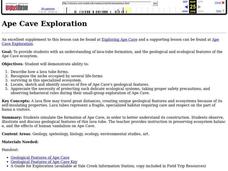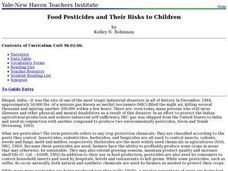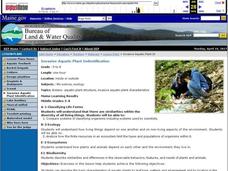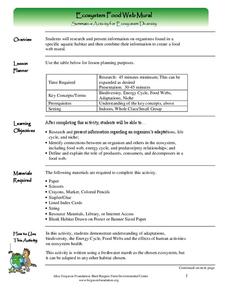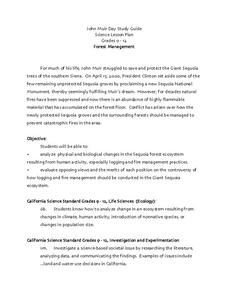Curated OER
What's the Big Deal?
Students define terms and describe where they are found and formed. In this methane lesson students complete an activity and describe ways in which methane hydrates impact our lives.
Curated OER
Rice: The Global Crop
Students understand the uniqueness of the rice plant and how it grows. Students compare rice growing in Indonesia and California, observing the steps common to the process everywhere. Students comprehend the concepts labor-intensive and...
Curated OER
Ape Cave Exploration
Students simulate online the formation of Ape Cave, in order to better explain its construction. They observe, illustrate and discuss geological features of this lava tube.
Curated OER
Hands On Biodiversity: Networking Students and Their Biomes
Students telecommunicate and use the US Mail to network students from five biomes in the United States in order to monitor water quality in each area. They have e-mail pals and exchange materials representative of themselves and their...
Curated OER
Magnificent Metamorphosis
Students discover stages in metamorphosis through up close and real encounters with video, hands-on investigative and interactive activities using mealworms.
Curated OER
Food Pesticides and Their Risks to Children
Students examine an industrial disaster in India which affected the food for generations to come. In groups, they research the history of pesticides and place them into groups based on the type of pests they control. They partcipate in...
Curated OER
Mangrove Ecology and Adaptations
Students create a plant or animal that would be well adapted to a habitat they selected. They first learn about Mangroves and their specific adaptations that help them survive in their habitat.
Curated OER
Mangrove Ecology & Adaptations
Pupils creat a plant, animal, or other living organism that would be well adapted to a habitat that they previously selected. First they learn about adaptations of Mangroves.
Curated OER
Chemistry In Plant Nutrition And Growth
Young scholars investigate different factors that affect plant growth. They research the effects of water supply, radiant energy, air temperature, and soil temperature. Students also gather facts that influence plant nutrition that...
Curated OER
Earth: The Apple of our Eye
Students are led through a demonstration in which they cut open an apple, which represents the earth. They follow through the hands-on activity, cutting the apple into various portions--each representing some aspect of the earth.
Curated OER
Scales, Scutes, and Skins
Students identify the various adaptations of reptiles and amphibians. After distinguishing between reptiles and amphibians, students discuss the ways in which their adaptations aid in their survival. They participate in a hands on...
Curated OER
Who's New in the Deep Sea?
Students examine the methods and technology that scientists use to study the deep sea and other remote environments. For this ocean habitats lesson students make observations about organisms from video clips, generate questions and...
Curated OER
How Far Away is a Tropial Rainforest?
Students explore how far a rainforest is from their home. In this rainforest lesson students examine how far they live away from the rainforest. Students use the length of their school day to compare how long it will take to travel to...
Curated OER
All Hands on Deck: A Harbor Education Program
Students build a model of an estuary. In this wetland lesson, students build a model estuary with a paint tray and modeling clay. They use the model to illustrate the impact of non-point pollution on the watershed.
Curated OER
Invasive Aquatic Plant Identification
Students observe aquatic plants and animals and identify their systems. In this plants and animals lesson plan, students compare systems of organisms and orally express how plants and animals rely on each other.
Curated OER
Lesson 2 of 5 - Energy
Learners complete an energy analysis for the No Impact Man project. In this environment and energy lesson, students review the project by visiting the given website and discuss the issue of electricity in the project. Learners watch...
Curated OER
Ecosystem Food Web Mural
Learners create a food web mural about an ecosystem of the freshwater marsh. For this food web lesson plan, students write about the organisms and how each one depends on another.
Curated OER
Are Polymers Photodegradable?
Students study the term photodegradability and how it applies to the 6-pack loop ring. In this materials lesson students test photodegradability of the 6-pack plastic ring.
Curated OER
Alien Invasion
Students research how alien species can change an ecosystem. In this coral reef lesson, students describe invasive species and site evidence how these species came to be invasive and what control measures are possible.
Curated OER
Arctic cleanup
Ninth graders examine pollution problems and how it affects the community. In this arctic cleanup instructional activity students study ocean currents and how they affect pollution.
Curated OER
Natural Selection: Exploring the 'Ohi'a Common Garden
Seventh graders examine natural variation by visiting the Ohi'a Common Garden in Volcano, Hawaii. In this natural selection lesson, 7th graders study background information about phenotypes, genotypes, and phenotypic plasticity before...
Curated OER
Forest Management
Young scholars explore the changes in the Sequoia forest ecosystem. They evaluate reasons for the changes and discuss opposing views of human activity, logging and fire management practices. Students observe a video, describe the...
Curated OER
Forest Management
Students analyze physical and biological changes in the Sequoia forest ecosystem, especially logging and fire management practices. They evaluate the controversy of how logging and fire management should be conducted in the Giant Sequoia...
Curated OER
The Very Clumsy Click Beetle
Second graders determine what it means to be clumsy before listening to Eric Carle's, The Very Clumsy Click Beetle. They examine the part where the click beetle does flips before drawing three frames that show the beetle flipping. For...


